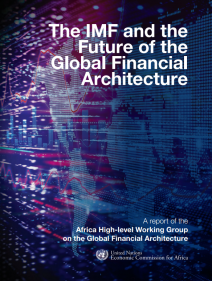The IMF and the Future of the Global Financial Architecture comes as part of the work of the High-level Working Group on the Global Financial Architecture. The working group was set up to design and champion proposals to reform the global financial architecture and to strengthen Africa’s voice in discussions on this issue. Part of its work is encapsulated in this report—prepared by UNECA in consultation with African Ministers of Finance, Planning, and Economic Development; the African Union; and the African Development Bank—to propose a new work agenda for the IMF to respond more capably to the challenges that low- and middle-income countries are facing. This report aims to put forward some of the new thinking and policymaking that the IMF will need to fulfill its new Bretton Woods moment. Four principles will help guide this effort. First, the IMF’s SDR policies should be less discretionary and more rule-based and analytical. Second, the IMF’s lending horizon and outlook on balance-of-payments problems should prioritize the long term. Third, the IMF must work more assiduously to redress structural inequalities in the global financial architecture by giving greater representation and tending more proactively to the problems affecting low- and lower-middle-income countries. Fourth, the IMF should align its overall engagement, including its policy and lending instruments, to play a highly catalytic role in mobilizing additional sources of financing while fostering closer collaboration with the World Bank and other multilateral development banks (MDBs). The IMF and the Future of the Global Financial Architecture is divided into five chapters: “Global financial safety net,” “A new global debt architecture,” “The Resilience and Sustainability Trust and a new agenda for green development,” “A new agenda for market access,” and “An International Monetary Fund for the 21st century: Lending, governance, and future direction.” Together they form a Ten Point Plan of near- and long-term recommendations for the IMF to address enduring and emerging challenges in the global financial architecture.
Share this:
A report of the Africa High-level Working Group on the Global Financial Architecture
Release Date:
18 novembre, 2024
© United Nations Economic Commission for Africa

